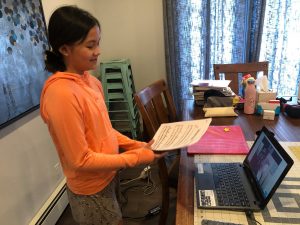Music Conservatory of Westchester’s Virtual Lessons Go Beyond County
By Madeline Rosenberg

When the Music Conservatory of Westchester shut down in early March, voice teacher Mary Elizabeth Poore knew she had to find a way to keep her students singing.
With some research, a new microphone and speakers, Poore started her regular lesson schedule from her Manhattan apartment a few days after the announcement of the closure. Instead of meeting in conservatory rooms, she and her students share a Zoom screen.
“I just thought, I’ve got to get on this right away and make it all happen,” said Poore, who has taught at the conservatory for almost 30 years. “When the conservatory first shut down, I had never done any virtual platform at all, and I knew this was a time that I needed to explore that and waste no time setting it up.”
The White Plains nonprofit community music school swiftly made its private and group lessons go virtual. Poore, who has continued virtual lessons with her 30 students, is one of more than 70 faculty at the conservatory that adapted their lessons for students sequestered at home, allowing the school to continue teaching and even expand its reach outside of Westchester.
The virtual private lessons are a close match to in-person instruction.
“It’s just over a screen,” said Adriana Rivera, the conservatory’s communications and marketing manager.
However, these private sessions feel more focused than before, Poore said, with fewer distractions and no one walking down the hallway to disrupt a lesson.
“This is a real concentrated one-on-one,” Poore said. “It’s really possible to work on a lot of detailed sections of their work whether it be technique or having to do with music.”
But transitioning to virtual lessons also came with some changes and a steep learning curve. Poore eventually learned to play the piano ahead of singers to account for the delay in every video conferencing platform. She also sends her students recorded piano accompaniments and uses an app to scan sheet music.
Virtual lessons have also pushed conservatory students, from elementary school age to older adults, to notice the details of their performance – especially now that they see themselves on camera.
These details have become important for students who have joined one of Poore’s five virtual recitals or those that other teachers have hosted to keep the community sharing music. Now, lighting and facial expressions matter even more, teaching students a new style of performing and allowing them to connect when they’re physically apart.
“Because it is a screen rather than looking at a stage, you just are intimately connected with the performer,” Poore said. “We want to see the thoughts on a singer’s face, but when it’s so isolated and it’s really just your face on screen, it’s something else to be careful of and work on.”
What’s more, virtual recitals and lessons have connected new faces to the conservatory community. Relatives who live in Canada and the United Kingdom have cheered on students during Poore’s Zoom recitals.
Rivera said student enrollment for virtual lessons has also stretched beyond Westchester. With no need to drive to White Plains, the conservatory has attracted new students from Dutchess and Putnam counties, as well as New Jersey and Connecticut. She said musicians are also finding virtual lessons more flexible for the same reason, allowing parents of younger students to regain the time it once took to drive them to the school.
This flexibility and broader reach prompted the conservatory to launch an online division for the fall, even as the music school plans to return to in-person instruction. Rivera said the conservatory had been hoping to eventually roll out virtual lessons, but accelerated that type of programming.
More than three months later, Poore said her students have enjoyed their lessons and have continued improving.
“I needed to continue to make music, because I knew that going on weeks or months, we didn’t know how this was going to continue,” Poore said. “I felt a loyalty to my students. I wanted them to still have music in their lives while things ruptured around them.”
The conservatory is also launching virtual summer programs starting this week for grades K-7 to give students a sense of consistency and a musical outlet.
“Continuing that musical journey is really important,” Rivera said. “No matter what, teachers are really encouraging their students and they’re getting a lot out of it.”
For more information about the Music Conservatory of Westchester, visit www.musicconservatory.org.

Examiner Media – Keeping you informed with professionally-reported local news, features, and sports coverage.
